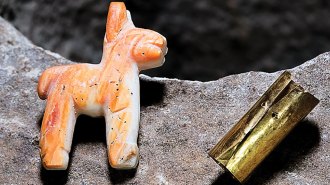Humans
Sign up for our newsletter
We summarize the week's scientific breakthroughs every Thursday.
-
 Psychology
PsychologyWhy do we miss the rituals put on hold by the COVID-19 pandemic?
Even solitary rituals bind us to our groups and help calm anxieties. What happens when those traditions are upended?
By Sujata Gupta -
 Science & Society
Science & SocietyInterfaith soccer teams eased Muslim-Christian tensions — to a point
Soccer bonded Christian and Muslim teammates in Iraq, but that camaraderie didn’t change attitudes.
By Sujata Gupta -
 Archaeology
ArchaeologyThe oldest known grass beds from 200,000 years ago included insect repellents
Found in South Africa, 200,000-year-old bedding remnants included fossilized grass, bug-repelling ash and once aromatic camphor leaves.
By Bruce Bower -
 Health & Medicine
Health & Medicine4 reasons you shouldn’t trash your neck gaiter based on the new mask study
Despite news coverage to the contrary, the study was meant to figure out how to evaluate masks, not actually do the comparison.
-
 Health & Medicine
Health & MedicineHere’s what we know about Russia’s unverified coronavirus vaccine
Despite incomplete testing, Sputnik V may be the first COVID-19 vaccine given to the general public, rolling out initially to teachers and doctors.
-
 Health & Medicine
Health & MedicineHow two coronavirus drugs for cats might help humans fight COVID-19
Scientists are exploring if drugs for a disease caused by a coronavirus that infects only cats might help also people infected with the coronavirus.
-
 Anthropology
AnthropologyBetter playground design could help kids get more exercise
Playgrounds designed for imaginative play can make a difference in how much kids move
By Emily Anthes -
 Climate
ClimateEmissions dropped during the COVID-19 pandemic. The climate impact won’t last
New estimates suggest coronavirus shutdowns cut global carbon dioxide emissions from fossil fuels by nearly 30 percent, on average.
-
 Health & Medicine
Health & MedicineRogue immune system reactions hint at an early treatment for COVID-19
A comprehensive look at the immune system shows multiple ways it misfires in COVID-19. Treating with interferon early might prevent trouble later.
-
 Health & Medicine
Health & MedicineFive big questions about when and how to open schools amid COVID-19
Researchers weigh in on how to get children back into classrooms in a low-risk way.
-
 Archaeology
ArchaeologyA submerged Inca offering hints at Lake Titicaca’s sacred role
Divers found a stone box holding a figurine and a gold item, highlighting Lake Titicaca’s sacred status to the Inca.
By Bruce Bower -
 Health & Medicine
Health & MedicineHeavy drinking drove hundreds of thousands of Americans to early graves
From 2011 to 2015, more than 93,000 U.S. deaths per year could be tied to excessive alcohol use, researchers say.